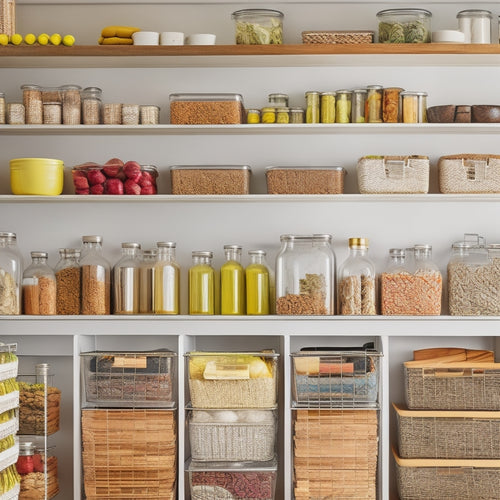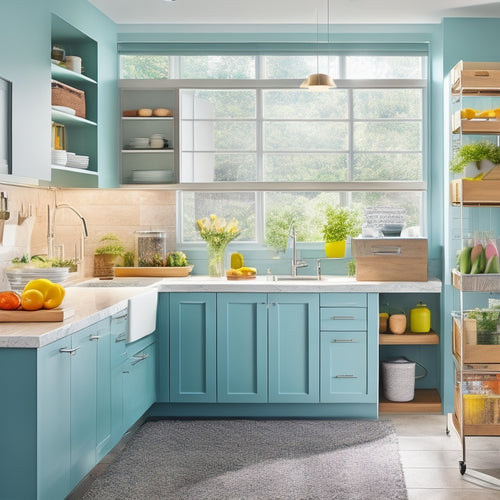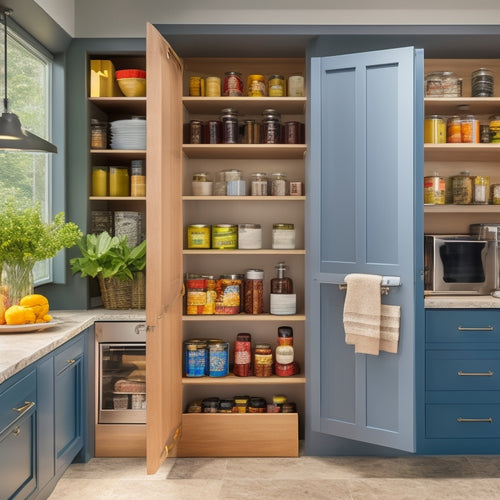
Home Food Sales Legality in Pennsylvania Uncovers
Share
In Pennsylvania, home food sales are governed by a complex set of regulations, guidelines, and restrictions. Cottage food businesses must comply with pH requirements, mandatory lab testing, and workplace rules to ensure food safety and quality. Registration with the Pennsylvania Department of Agriculture involves submitting an application, conducting lab testing, and paying a $35 fee. Business owners must also follow guidelines for labeling, packaging, and safe food handling practices. Moreover, there are limitations on children, pets, and domestic activities in production areas. By navigating these regulations, home food sellers can ensure compliance and safety in their operations, and unlock a wealth of opportunities.
Key Takeaways
• In Pennsylvania, home food sales are legal, but operators must comply with regulations, such as pH requirements and lab testing for certain products.
• Business registration with the Pennsylvania Department of Agriculture is mandatory, including a $35 fee and submission of a business plan.
• Operators must follow guidelines for selling venues, labeling, and packaging, as well as ensure a clean and safe work environment.
• Certain foods, like canned goods and chocolate-covered fruits, have specific regulations and restrictions, including pH levels and lab testing.
• Home food businesses must comply with the PA Food Code, ensuring proper food handling, storage, and sanitation to prevent contamination.
Pennsylvania Home Food Sales Regulations
In Pennsylvania, home food sales are subject to regulations that outline specific requirements and restrictions for entrepreneurs operating in this sector, guaranteeing the safety and quality of food products for consumers.
One key aspect of these regulations is the pH requirements for certain products, such as chocolate-covered fruits, which must have a pH level of 4.6 or below. Additionally, lab testing is required for certain products to verify they meet safety standards.
Entrepreneurs must also adhere to specific guidelines for selling venues, including events, farmers' markets, and online sales. Moreover, workplace guidelines dictate that business ingredients must be kept separate, and entrepreneurs must comply with the PA Food Code, Title 3, Chapter 57, Subchapter B.
Starting a Cottage Food Business
Starting a cottage food business in Pennsylvania requires careful consideration of the state's regulations and guidelines, which are designed to guarantee the safety and quality of homemade food products. To make sure of success, keeping up-to-date on cottage food trends and complying with packaging requirements is crucial.
| Regulation | Requirement |
| Allowed Foods | Certain items require lab testing, pH restrictions for chocolate-covered fruits |
| Business Registration | Submit application, lab testing for safety, complete plan review application, home inspection, $35 registration fee |
| Labeling Requirements | Include allergens, business address, ingredients, net amount, product name |
| Workplace Guidelines | Keep business ingredients separate, check PA Food Code, Title 3, Chapter 57, Subchapter B for details |
| Limitations | Children restricted, no domestic activity, pets prohibited |
Food Guidelines and Restrictions
Three key areas of food guidelines and restrictions in Pennsylvania are lab testing, pH restrictions, and rules governing non-potentially hazardous foods. Lab testing is required for certain canned foods and drinks to guarantee safety.
pH restrictions apply to chocolate-covered fruits, which must have a pH of 4.6 or below to prevent contamination.
Non-potentially hazardous foods, such as baked goods and candies, are allowed, except for certain exceptions. Food categories, including most non-refrigerated foods without meat or cheese, are permitted for sale.
Special rules govern the production of honey, and it is crucial to check the PA Food Code for details. These guidelines and restrictions are in place to protect consumers and ensure the safe production and sale of food from home in Pennsylvania.
Home Food Business Limitations
Operating a home food business in Pennsylvania comes with specific limitations, including restrictions on domestic activities, children's involvement, and pet presence in the production area. These limitations are in place to ensure the safety and quality of the food being created.
Here are three key limitations to be aware of:
-
Children restrictions: Children are not permitted to be involved in the food production process to prevent contamination and maintain a safe environment.
-
Pet prohibition: Pets are not permitted in areas where food is being produced, stored, or handled, with the exception of caged pets like birds or snakes, which must be kept away from the kitchen.
-
No domestic activities: Domestic tasks such as laundry, dishwashing, and cooking for personal consumption are not permitted in the production area to prevent cross-contamination and uphold a clean environment.
Registering Your Home Food Business
To legally operate a home food business in Pennsylvania, entrepreneurs must complete a registration process that involves submitting an application, undergoing lab testing for certain products, and paying a $35 registration fee. This process ensures that food products meet safety standards, and entrepreneurs are aware of the regulations that govern their business.
| Registration Requirements | Description |
|---|---|
| Application | Submit a completed application to the Pennsylvania Department of Agriculture |
| Lab Testing | Conduct lab testing for certain products to guarantee safety and quality |
| Business Plan | Develop a detailed business plan outlining ingredients, storage, production methods, and sales locations |
Ensuring Compliance and Safety
Compliance with Pennsylvania's food safety regulations is crucial to preventing contamination and guaranteeing the production of safe, high-quality products for consumers. To achieve this, home food sellers must implement effective compliance measures and safety protocols.
Regular cleaning and sanitation: Guarantee all equipment, utensils, and work surfaces are cleaned and sanitized regularly to prevent cross-contamination.
Proper food handling and storage: Handle and store food products in a way that prevents contamination, spoilage, and pest infestation.
Labeling and packaging: Guarantee accurate labeling and packaging of products, including ingredient disclosure, allergen warnings, and net quantity statements.
Resources for Home Food Sellers
Beyond ensuring compliance with Pennsylvania's food safety regulations, home food sellers can leverage various resources to support their business operations and stay up-to-date on industry best practices.
The Pennsylvania Department of Agriculture offers a forum for home food sellers to access a community of individuals knowledgeable about the state's food selling laws, providing valuable insights on best practices and opportunities for collaboration.
Additionally, home food sellers can tap into local networking opportunities, such as farmers' markets and food festivals, to connect with potential customers and gain exposure for their products.
In addition, resources on marketing strategies and product development can help home food sellers refine their offerings and reach a wider audience, ultimately driving business growth and success.
Frequently Asked Questions
Can I Sell Homemade Pet Treats From My Pennsylvania Home?
In Pennsylvania, selling homemade pet treats from home is allowed, but requires registration and compliance with packaging and labeling regulations. You can sell at farmers markets or online, ensuring safe and properly labeled products for pet owners.
Do I Need Liability Insurance for My Home-Based Food Business?
As a prudent entrepreneur, consider liability insurance an essential ingredient in your home-based food business recipe, much like accurately labeling products, to safeguard against unforeseen circumstances, ensuring compliance with business registration requirements and protecting your venture's reputation.
Can I Use a Shared Kitchen Space for My Cottage Food Operation?
When considering kitchen rental for your cottage food operation, maintain compliance with Pennsylvania regulations and food safety requirements, including proper licensing, permits, and adherence to the PA Food Code to maintain a safe and legal operation.
How Do I Handle Sales Tax for My Home-Based Food Sales?
'As you savor the sweetness of your cottage food business, don't forget to taste the bitter truth of sales tax obligations. Guarantee compliance by understanding tax exemptions, consulting health department regulations, and accurately reporting your sales to avoid a recipe for disaster.'
Can I Sell My Homemade Food Products to Local Wholesalers?
To sell homemade food products to local wholesalers, guarantee compliance with food safety regulations and licensing requirements, obtaining necessary permits and licenses, and meeting standards for production, packaging, and labeling to assure a safe and legal supply chain.
Related Posts
-

Tiered Racks for Kitchen Pantry Organization
Tiered racks can enhance your kitchen pantry by maximizing vertical storage and increasing visibility. They help you ...
-

Sink Storage Solutions for Open-Concept Kitchens
To maximize storage in your open-concept kitchen, focus on clever under-sink solutions and vertical space utilization...
-

Affordable Sliding Pantry Drawer Solutions
If you're looking for affordable sliding pantry drawer solutions, you're in the right place. These drawers maximize s...


